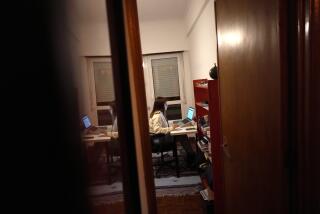Ignore ‘Em, Though Those Sluggard Co-Workers Probably Won’t Go Away
- Share via
There’s one in every company. He’s probably sitting nearby, irritating colleagues with his incessant kvetching. And he’s probably been sitting there since the day he was hired, many, many years ago.
Who is he?
The guy who won’t leave.
He--or she--is easy to spot. No one can quite figure out what this person does. His main occupation appears to be taking all day to do an hour’s work. But his bad attitude and poor work ethic aren’t just his problems, workplace experts say. They affect everyone in his department.
“If a person is just there on the dole, it can be very destructive,” said John Challenger, president of Challenger, Gray & Christmas Inc., a career-consulting firm based in Chicago. “What happens is you get co-workers who don’t want to do their own job and don’t want to work as hard because they don’t sense any penalty for not doing well.”
In today’s work world--with lean, mean companies trying to milk all employees for all they’re worth--these space-fillers are more detrimental than ever, experts say. They hurt the morale of their co-workers and can significantly affect productivity.
“It used to be that companies felt more responsible than they do today,” Challenger said. “They were kind of like lords of state: They knew some employees didn’t have skills, but they took care of people. Today there’s so much emphasis on productivity, it’s very hard to hide if you’re not doing well.”
Nevertheless, there are still these types of workers in virtually every department of every corporation. At MCI Communications Corp.’s Pentagon City, Va., office, longtime dillydalliers abound, workers say.
“There’re a couple guys on my team that effectively do nothing,” said one employee, who did not want to be named. There are only eight people on his team, he said, so having one or two members consistently drag their feet slows everyone down.
“One of the managers,” he noted, “has been here about 10 years. Effectively all he does is sit in on meetings and write notes. That’s all we can determine he does, at least; no one really knows. He’s a nice enough guy, and I guess he’s happy doing what he’s doing, but all he does is create problems because he slows us down.”
For instance, the manager required the team to postpone a meeting for two weeks so he could fit it into his schedule. Even when it took place, the manager did little more than nod and take notes, the worker reported, frustrating the entire group, whose progress had been severely slowed waiting to have the meeting.
“Now we just try to avoid him as much as possible,” the worker said. “We just don’t let him know when we’re having a meeting.”
Ignoring sluggards is one wise way to handle the problem, Challenger said. And look at your own motives.
“Everybody who works hard has to accept that part of the reason they work hard is for themselves,” Challenger said. “When someone else is not carrying their share of the load, you just have to get back to your basic principles and proceed in the way you want to work.”
Sometimes managers will be reluctant to give problem employees the boot because these people used to be highly productive workers, experts say. That situation may be compounded by these people’s tenure. Since they’ve been around for so long, they’re likely to be friends with their bosses, which makes the situation that much trickier for management to handle.
And then there’s the fact that having to deal with a poor performer is something many managers would rather avoid, Challenger said.
*
So what should companies do?
“You have to talk to [the workers] frankly,” Challenger said. “Often people are like that because of circumstance. You have to sit down and address the issues with that person and let him know you’re trying to find a solution. It doesn’t work in this case to be yelling, screaming and criticizing.”
Simply transferring an employee to another department doesn’t do any good, either, he added.
It’s advice that the federal Department of Housing and Urban Development ought to heed, says one of its employees.
“I can think of at least two people that go to sleep in the middle of meetings on a continual basis,” said the worker, who did not want to be named. “One nodded off in front of her manager, and she wasn’t too thrilled about that. But basically everyone just ignores them.”
So what do these people do all day?
“They’ve got Internet connections,” the HUD employee said. “Some play solitaire all the time.”
More to Read
Inside the business of entertainment
The Wide Shot brings you news, analysis and insights on everything from streaming wars to production — and what it all means for the future.
You may occasionally receive promotional content from the Los Angeles Times.









